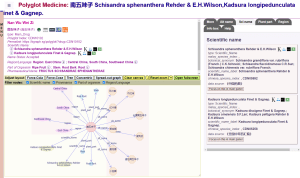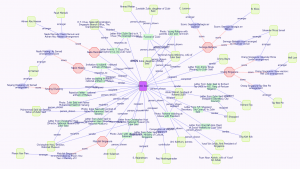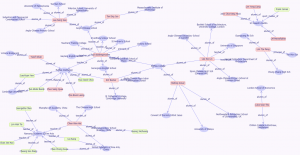Polyglot Medicine Knowledge Graph
The Polyglot Medicine Knowledge Graph system is launched: https://kgraph.sg/polyglot. This is a project to develop a database of Asian traditional and herbal medicines. Current database coverage is mainly on Chinese traditional medicines, expanding to Malay and Southeast Asian traditional medicines. The knowledge graph currently links the medicine names in the original and English languages, to alternative names and scientific names, to plant/animal parts they are made from, to literary and historical sources they were mentioned in, to geographic areas they were associated with, and to external database records with information on them. There are plans to link the medicines to pharmacological information later....
Article: Information structures in sociology research papers: Modeling cause–effect and comparison relations in research objective and result statements
Cheng, W.-N., & Khoo, C.S.G. (2021). Information structures in sociology research papers: Modeling cause–effect and comparison relations in research objective and result statements. Journal of the Association for Information Science & Technology, 72(11), 1367-1385. Abstract. When writing a research paper, the author has to select information to include in the paper to support various arguments. The information has to be organized and synthesized into a coherent whole through relationships and information structures. There is hardly any research on the information structure of research papers, and how information structure supports rhetorical and argument structures. Thus, this study is focused on information organization in the Abstract and Introduction sections of sociology research papers, analyzing the information structure of research objective, question, hypothesis, and result statements. The study is limited to research papers reporting research that investigated cause–effect relations between two concepts. Two semantic frames were developed to specify the types of...
Explore a Zubir Said Knowledge Graph & Visualization
Version 1 launched in July 2021: https://ZubirSaid.sg The project seeks to develop a knowledge graph and visualization interface for the Zubir Said digital archive collection – as an example of applying knowledge graph technologies to digital heritage/archive content. Zubir Said was the composer of the Singapore national anthem and a pioneer songwriter in Singapore. The knowledge graph represents materials and content in Zubir Said’s personal archive as a network of concepts to support visualization, associative browsing, and research. Starting with a Musical Work (e.g., Majulah Singapura), compare different versions and arrangements (Music Score), check out different Performances, and view the related Item (audio/video/image/PDF file). Browse a social network of people with links to Zubir Said. Or Browse by genre – photos, letters, speeches, documents, commentary, news, documentaries. A text-based browse interface is also available....
Explore a Knowledge Graph and Social Network of Singapore Pioneers
Version 1 launched in Dec 2021: https://SingPioneers.sg The project sought to explore the social networks of selected pioneers in post-war Singapore, using Singapore Infopedia, the National Library Board’s electronic encyclopedia on Singapore, to map the characteristics of pioneers including relationship types (e.g., kinship, business, industry, cultural, etc.) and entities (e.g., schools, organisations, activities, and places) that mediate these relationships. Version 1 of the system features 20 SingPioneers with a handcrafted knowledge graph. Work is ongoing to develop an automatic information extraction program to extract information from over 400 biographies to populate the knowledge graph and social network. Based on research by Ng Siam Gek as a National Library Digital Fellow with the National Library Board, Singapore, in collaboration with Chris Khoo (Nanyang Technological University)....
Workshop on Ontology & Rich Semantics (RICH 2019)
Call for proposals — submission deadline 23 Sep 2019 Workshop on Ontology and Rich Semantics (RICH 2019): Exploiting Knowledge Graphs Pre-conference workshop of A-LIEP/ICADL 2019 conferences (https://fim.uitm.edu.my/conf2019/) Date of event: Monday, 4 Nov 2019, 2pm-6pm Venue: TTDI (Taman Tun Dr Ismail) Library, Jalan Athinahapan TTDI, 60000 Kuala Lumpur, Malaysia Location on Google Maps: https://www.google.com.sg/maps/place/Pustaka+KL+@+TTDI/@3.1469045,101.6213235,16.75z Organisers: Dr Chris Khoo & Dr Robert B Allen Target audience: academics, researchers, graduate students, librarians and knowledge organization professionals–who are doing research and professional work related to knowledge organization, ontology and metadata. Deadline for presentation proposals: Mon, 23 Sep 2019 Description: Explicit rich representations of domain knowledge, models, processes, historical development, and argumentation are important to support e-science, e-social science and digital humanities research. Ontologies define concept hierarchies and identify important types of relations between concepts as well as entities of interest. However, to support e-research as well as real applications, ontologies need to...
Workshop on Ontology & Rich Semantics (RICH 2018)
Workshop on Ontology and Rich Semantics: Frameworks and Application Date of event: Mon, 26th Nov. 2018, 9:30am to 4:00pm Venue: Wee Kim Wee School of Communication & Information, Nanyang Technological University, Singapore Organisers: Dr Chris Khoo, Dr Robert B Allen, & Dr Shigeo Sugimoto For more information: see blog page, or Facebook event . Description: Explicit rich representations of domain knowledge, models, processes, historical development, and argumentation are important to support e-science, e-social science and digital humanities research. Ontologies define concept hierarchies and identify important types of relations between concepts as well as entities of interest. However, to support e-research as well as real applications, ontologies need to go beyond simple semantics to include representation of complex structures and systems, dynamic models and processes, flow of temporal events, as well as discourse structure, evolution of knowledge, argumentation and information across types of documents and media. This workshop will explore frameworks...
Article: Task-based navigation of a taxonomy interface to a digital repository
Khoo, C.S.G., Wang, Z., & Chaudhry, A.S. (2012). Task-based navigation of a taxonomy interface to a digital repository. Information Research, 17(4). (Available at: http://informationr.net/ir/17-4/infres174.html) Abstract Introduction. This is a study of hierarchical navigation; how users browse a taxonomy-based interface to an organizational repository to locate information resources. The study is part of a project to develop a taxonomy for an library and information science department to organize resources and support user browsing in a digital repository. Method. The data collection was carried out using task-based navigation exercises with twenty-two participants. A cognitive framework of hierarchical navigation is proposed, involving the cognitive process of matching context, topic and/or resource type concepts to taxonomy categories. Results. Though users often use the topic concept in making navigation choices, they sometimes make use of context and resource-type concepts. Users infer a variety of relationships between a task concept and a taxonomy category, including...
Conference paper: Categories of friends on social networking sites
Zhang, X., Gao, Q., Khoo, C., & Wu, A. (2013). Categories of friends on social networking sites: An exploratory study. In The 5th International Conference on Asia-Pacific Library and Information Education and Practice (A-LIEP 2013): Proceedings (pp. 244-259). Khon Kaen City, Thailand: University of Khon Kaen, Faculty of Humanties and Social Sciences. Abstract: The widespread use of social networking sites has transformed the ways people make, communicate with and manage their friends. This study seeks to find out students’ perception of the types of friends they have on their social networking sites (SNS), such as Facebook and Twitter, in comparison to offline friends, and the quality of these friendships. A questionnaire survey was administered to 104 graduate students in the Division of Information Studies at the Nanyang Technological University, Singapore. It was found that the main categories of friends on SNS are school friends, work-related friends, friends sharing...
Conference paper: Framework for analyzing organizational stories
Lee, L.-P., Liu, H.-W., Shi, D.-M., Khoo, C.S.G., & Pang, N. (2013). Developing a framework for analyzing organizational stories. In The 5th International Conference on Asia-Pacific Library and Information Education and Practice (A-LIEP 2013): Proceedings (pp. 260-271). Khon Kaen City, Thailand: University of Khon Kaen, Faculty of Humanties and Social Sciences. Summary: Stories are becoming an increasingly important knowledge management and knowledge sharing tool to communicate ideas, values and experiences both to internal organizational members and to external stakeholders. This paper reports an initial effort to develop a framework for the analysis of organizational stories. The framework has two major parts: the story framework comprising six elements, and the interaction/communication framework. The six elements of a story are: Background to the story—the context in the story itself, the prior situation and events leading up to the story. Core of the story—the essence or summary of the story, the...
Conference paper: A user study of the Singapore Memory Portal to derive a taxonomy for content organization
Srieedar, J., & Khoo, C.S.G. (2013). A user study of the Singapore Memory Portal to derive a taxonomy for content organization. In Proceedings of the 2013 Digital Heritage International Congress, 28 Oct-1 Nov 2013, Marseille, France (IEEE catalog no. CFP1308W-USB, pp. 297-305). Summary: This paper reports an initial user study of a cultural heritage portal called Singapore Memory Portal that was set up in Singapore to collect people’s memories related to the history, culture, society, life and landscape of Singapore’s past. The study sought to find out users’ expectations of the content of the portal, how they search and browse the portal, and what they learn about particular historical or cultural topics from reading postings in the portal. The goal is to derive a taxonomy to organize the portals’ content for browsing and learning. For this initial study, 12 Singapore citizens were interviewed to find out what topics...




